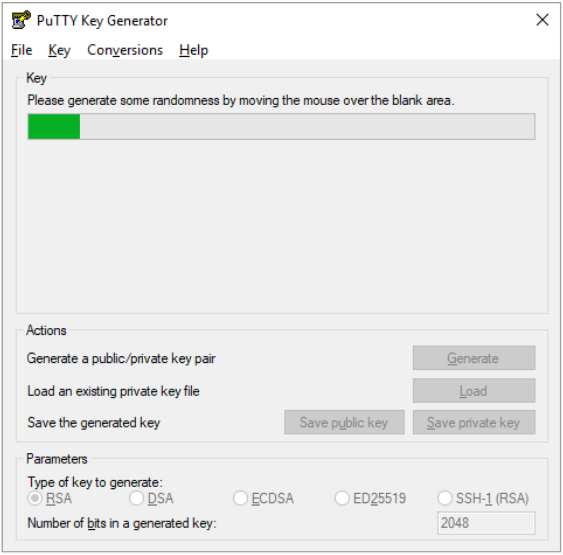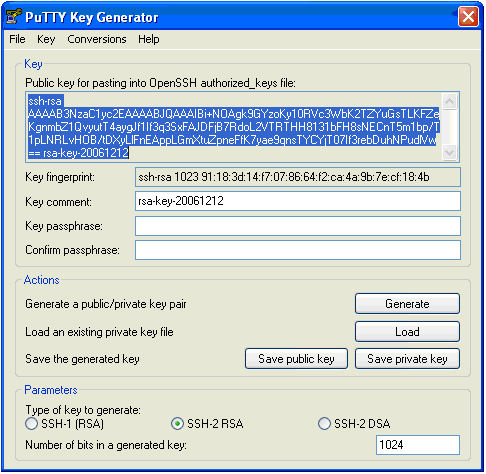Generating A Public Key For Ssh
Several tools exist to generate SSH public/private key pairs. The following sections show how to generate an SSH key pair on UNIX, UNIX-like and Windows platforms.
Sep 06, 2019 Generating your key pair and propagating your public key is simpler than it sounds. Let’s walk through it. Generating the key. The minimum effort to generate a key pair involves running the ssh-keygen command, and choosing the defaults at all the prompts: $ ssh-keygen Generating public/private rsa key pair. Jun 26, 2019 ssh-keygen -b 4096 The -b flag instructs ssh-keygen to increase the number of bits used to generate the key pair, and is suggested for additional security. Press Enter to use the default names idrsa and idrsa.pub in the /home/yourusername/.ssh directory before entering your passphrase. SSH public-key authentication remains an option for researchers who submit the 'SSH public-key authentication to HPS systems' user agreement (log into HPC everywhere using your IU username and passphrase), in which you agree to set a passphrase on. How to Generate a Public/Private Key Pair for Use With Solaris Secure Shell. Users must generate a public/private key pair when their site implements host-based authentication or user public-key authentication. For additional options, see the ssh-keygen(1) man page. Before You Begin. SSH keys are a way to identify trusted computers, without involving passwords. The steps below will walk you through generating an SSH key and adding the public key to the server. Step 1: Check for SSH Keys First, check for existing SSH keys on your computer. Open Git Bash, Cygwin, or Terminal, etc. Creating a private/public key pair¶. To generate an SSH private/public key pair for your use, you can either create a key pair in the user interface of Acquia Dev Desktop, or use the ssh-keygen command-line utility. Before you can access IBM Order Management servers or environments, you must generate a pair of public and private keys for SSH logon and provide IBM the public key. You can use the Cygwin key generator utility to create the public and private keys for SSH logon that you need for accessing IBM Order Management environment servers and applications.
Generating an SSH Key Pair on UNIX and UNIX-Like Platforms Using the ssh-keygen Utility
UNIX and UNIX-like platforms (including Solaris and Linux) include the ssh-keygen utility to generate SSH key pairs.

- Navigate to your home directory:
- Run the ssh-keygen utility, providing as
filenameyour choice of file name for the private key:The ssh-keygen utility prompts you for a passphrase for the private key.
- Enter a passphrase for the private key, or press Enter to create a private key without a passphrase:
Remo recover activation key generator. Note:
While a passphrase is not required, you should specify one as a security measure to protect the private key from unauthorized use. /driver-toolkit-license-key-generator-85.html. When you specify a passphrase, a user must enter the passphrase every time the private key is used.
The ssh-keygen utility prompts you to enter the passphrase again.
- Enter the passphrase again, or press Enter again to continue creating a private key without a passphrase:
- The ssh-keygen utility displays a message indicating that the private key has been saved as
filenameand the public key has been saved asfilename.pub. It also displays information about the key fingerprint and randomart image.

Ssh Generate Public Key From Private
Generating an SSH Key Pair on Windows Using the PuTTYgen Program
Generating A Public Key For Ssh Download
The PuTTYgen program is part of PuTTY, an open source networking client for the Windows platform.
- Download and install PuTTY or PuTTYgen.
To download PuTTY or PuTTYgen, go to http://www.putty.org/ and click the You can download PuTTY here link.
- Run the PuTTYgen program.
- Set the Type of key to generate option to SSH-2 RSA.
- In the Number of bits in a generated key box, enter 2048.
- Click Generate to generate a public/private key pair.
As the key is being generated, move the mouse around the blank area as directed.
- (Optional) Enter a passphrase for the private key in the Key passphrase box and reenter it in the Confirm passphrase box.
Note:
While a passphrase is not required, you should specify one as a security measure to protect the private key from unauthorized use. When you specify a passphrase, a user must enter the passphrase every time the private key is used.
- Click Save private key to save the private key to a file. To adhere to file-naming conventions, you should give the private key file an extension of
.ppk(PuTTY private key).Note:
The.ppkfile extension indicates that the private key is in PuTTY's proprietary format. You must use a key of this format when using PuTTY as your SSH client. It cannot be used with other SSH client tools. Refer to the PuTTY documentation to convert a private key in this format to a different format. - Select all of the characters in the Public key for pasting into OpenSSH authorized_keys file box.
Make sure you select all the characters, not just the ones you can see in the narrow window. If a scroll bar is next to the characters, you aren't seeing all the characters.
- Right-click somewhere in the selected text and select Copy from the menu.
- Open a text editor and paste the characters, just as you copied them. Start at the first character in the text editor, and do not insert any line breaks.
- Save the text file in the same folder where you saved the private key, using the
.pubextension to indicate that the file contains a public key. - If you or others are going to use an SSH client that requires the OpenSSH format for private keys (such as the
sshutility on Linux), export the private key:- On the Conversions menu, choose Export OpenSSH key.
- Save the private key in OpenSSH format in the same folder where you saved the private key in
.ppkformat, using an extension such as.opensshto indicate the file's content.